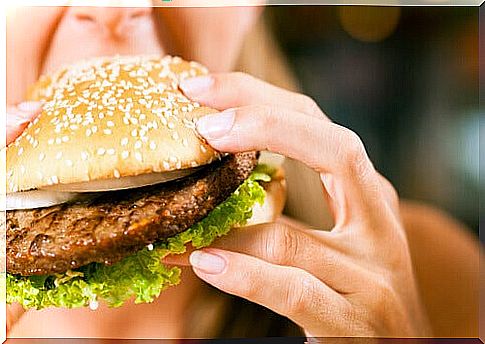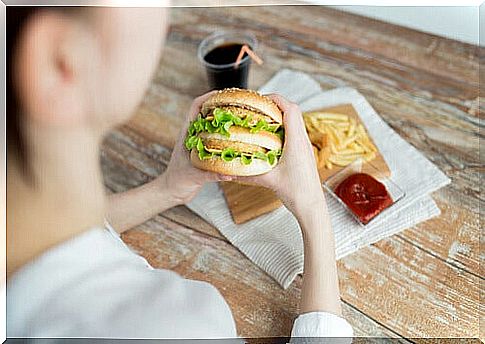Emotional Hunger: One Of The Favorite Disguises Of Anxiety

We all know what it means to be hungry, we all know the feeling of having an empty stomach and the need to eat something right away. We can easily identify when we are really hungry after several hours of fasting, but is the same true for emotional hunger?
We must not go hungry and not even let more than four hours go fasting or at least without having a snack between meals. However, we don’t always eat because we have a real physiological need, sometimes we do it to silence our emotions. We try to drown stress, sadness, anxiety in food, but in the long run our mood gets worse.
To put an end to the vicious cycle in which we eat without appetite and then feel guilty, it is important to distinguish emotional hunger from real hunger, a signal that the body sends us when it needs energy. We invite you to discover the characteristics of emotional hunger to learn to deal with it, to take back the reins of your life and your eating habits.
That said, let’s take a closer look at some aspects of emotional hunger.
1. We are seized with sudden cravings
Emotional hunger is not satisfied with a plate of vegetables or salad. Usually we eat low-nutritious and high-calorie foods, such as sweets, or foods rich in saturated fat, such as junk food.

2. We are insatiable
When we start to feel hungry, we know more or less the amount of food we need to feel full. In case of emotional hunger, we eat non-stop until we burst. Emotional hunger inhibits the feeling of satiety, as a result we feel full at a later time than when we really are.
3. We try to fill a void
We are not talking about an empty stomach, but a response to an emotional malaise that we do not deepen, but that we try to silence with food. The relief is only momentary and only lasts while we eat, which obviously cannot be infinite. If we felt bad before, after binging, we feel even worse.
4. We binge in solitude
Virtually no one is bingeing in the presence of other people, it is a kind of ritual that is done in solitude. Loneliness is often the trigger, although emotional hunger can occur on occasions such as weddings or birthdays.
5. We feel guilty
I didn’t have to eat the whole bag of chips, they are full of saturated fat, they raise bad cholesterol, I wasn’t even hungry, but I had to satisfy that need at all costs. After binging, we feel guilty and want to self-punish ourselves for failing to keep control.
6. Eating is an impulsive act
When we eat to satisfy emotional hunger, we do it without thinking, impulsively. We buy whatever we like.
7. We eat to escape our responsibilities
Maybe we have to work or study or we have signed up in the gym, but in the end we don’t have the strength and we stay at home. Inside of us we know that we have not done our duty and anxiety does not take long to knock on our door to keep us company. Here we open the refrigerator for the first time, looking for something to eat that acts as an anxiolytic.
Once this first whim is over, we feel worse than before: we have therefore accumulated a double sense of guilt, for not having done our duty and for having allowed ourselves this whim. We realize that while we eat we are not anxious, so we open the refrigerator a second time. We repeat this mechanism several times, until we feel extremely full.
Tips to satisfy emotional hunger without having to ransack the fridge
Now that you know the characteristics of emotional hunger, try to understand if you also suffer from it. The time has come to fight it. Here are some ideas to help you in this battle.
1. Try to eat healthy food
If you eat without feeling hungry, you will certainly not opt for healthy food or get full quickly. The body will let you know that it is not what it needs and you will think that it wants to trick you by awakening your appetite.

2. Reflect on the problem that triggers your emotional hunger
When you realize that you are not really hungry, but that it is a whim, then try to investigate the matter. Are you anxious about work? Do you have problems with your partner? Are you running all day and this frenetic pace continues even at home?
3. Play sports
Sport is useful for two reasons. First of all, it is a way to vent negative emotions. Thanks to physical activity, the body releases endorphins, which improve the mood and fight any form of anxiety.
Furthermore, after training, the body really needs energy and, therefore, will also appreciate healthy food.
4. Make a list of what you will eat throughout the day
This advice is to avoid the impulsive decision to eat. If you determine when, what and how to eat, you will know when your body requires a recharge of energy, so it will not be able to fool you that easily. By choosing what to eat first, you will also avoid bingeing on junk food.
5. Indulge in a few treats from time to time
While you should avoid junk food, you can indulge in a treat from time to time as long as it doesn’t become a habit.
6. Eat in company
When you eat in company, it is done more slowly. We hardly focus on our problems by ruminating all the time. Furthermore, we enjoy a double pleasure, company and good food, in this sense it will not be necessary to continue eating to maintain the feeling of well-being.

7. Don’t make food a reward
Sometimes, after a bad day, we reward ourselves with unhealthy food because “we deserve it”. If it becomes a habit, it will be difficult to replace junk food with healthy food.
8. Ask for help in solving the underlying emotional problem
Ask for help from a friend, family member, partner or specialist. It is clear that attempts to hide and manage this problem have not worked.
9. Think before buying unhealthy food
Why am I buying it? Do I really need it?
10. Make a shopping list of what you really need
Do not buy more things than necessary, fatty or sugary foods usually do not fall on the shopping lists, they respond more to an impulsive act.
In conclusion, the best technique to overcome anxious hunger is to understand the real needs of the body, distinguishing between the physiological need (hunger) and the emotional one. To deal with difficult situations, you need to take a proactive stance, well aware of the underlying problem and the best way to deal with it. Do not drown your emotions in food, choose a healthy life from a physical and psychological point of view.








